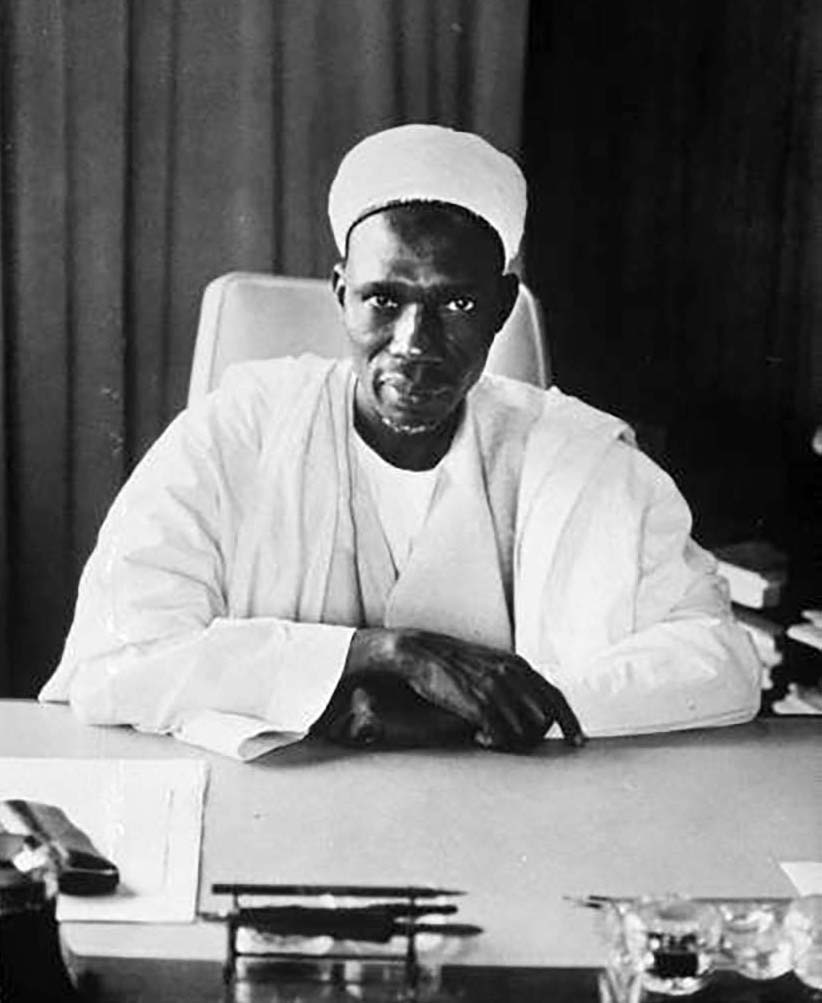Sir Abubakar Tafawa Balewa was the first Prime Minister of Nigeria before and after Nigerian independence from Great Britain in 1960.
Born in December of 1912 in Bauchi in Northern Nigeria, Balewa’s father, Mallam Yakubu, was a minor official in the Native Authority, part of the British colonial administration. Balewa received his primary education in Tafawa Balewa from 1922 to 1925. He then attended Bauchi Middle School in Bauchi from 1925 to 1928. Following this Balewa attended Katsina Teachers Training College from 1928 to 1933 where he received his teaching certification. After graduation, Balewa returned to Bauchi Middle School as a teacher where he taught English to his pupils.
During the next ten years, Balewa rose in the ranks of the teaching staff, qualifying as a Teacher Grade I in Nigeria in 1944. The following year he was admitted to the London University Institute of Education, receiving his diploma in 1946. Balewa returned to Bauchi Middle School in 1949 as Headmaster and afterward served briefly as Inspector of Schools in Nigeria.
Abubakar Balewa entered politics after returning to Nigeria. He and Alhaji Ahmadu Bello founded the Northern People’s Congress (NPC) to represent the Muslim majority in Northern Nigeria. Balewa was elected to the colony’s Northern House of Assembly in 1946 where he gave a famous and impassioned speech calling for a radical change in the Native Administration and its relations with Great Britain. Soon after this speech, the British began restructuring the Native Authority for self-rule and eventually Nigerian independence. In 1955 Balewa was appointed Federal Minister of Works and Transport by Nigeria’s Colonial Governor, Sir James Wilson Robertson. When Nigeria was granted self-governance in 1957 Balewa became Prime Minister. In January 1960, Balewa was knighted by Queen Elizabeth of Great Britain.
Following Nigerian independence on October 1, 1960, Balewa continued in his post as Prime Minister of Nigeria in a power-sharing arrangement with Nnamdi Azikiwe, the country’s first President. From the Muslim North of Nigeria and considered a pro-British conservative, Balewa often clashed with Azikiwe. While in office Balewa worked to develop Nigeria’s transport systems by helping to build ports, river transport systems, and railways.
As Prime Minister Balewa helped shape the early foreign policy of Nigeria. In 1960 he was instrumental in negotiating a settlement between factions in the Congo Civil War. He led his government in a vocal protest of the Sharpeville Massacre in South Africa and attempted unsuccessfully to persuade other British Commonwealth nations to expel South Africa because of its apartheid policies. Balewa also was one of the African leaders who encouraged the formation of the Organization of African Unity (OAU).
Sir Abubakar Tafawa Balewa was killed on January 15, 1966, in Lagos during a military coup d’état which ended The First Republic, Nigeria’s first civilian government.

